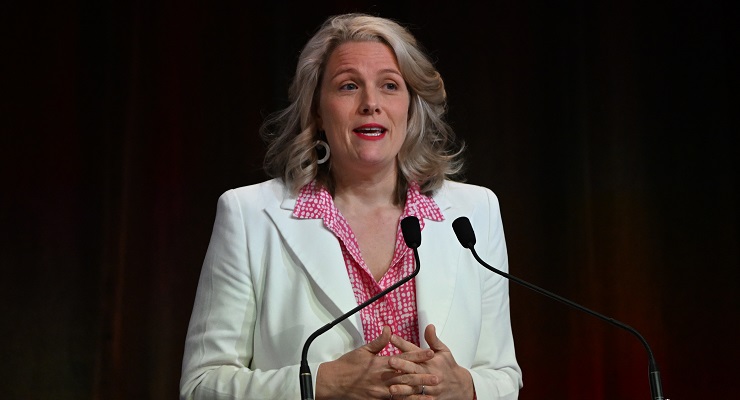
The words “evaluate”, “refresh”, “a pipeline of talent” and “diverse pool of people” have been used so many times at Canberra’s jobs and skills summit that they’ve lost all meaning.
The most anticipated event of the year for business leaders and unions canvassed important issues — especially around women’s participation in the workplace, with gender worked into almost every discussion.
But while some segments resulted in leaders calling for real, actionable change, just as many ended in vague goals and waffle, failing to put data, dollars or specific demands on the table. What’s more, some — including Atlassian’s Scott Farquhar and Visy’s Anthony Pratt — used their platforms to spruik what their companies were doing.
There has been action — around midday yesterday, Employment Minister Tony Burke announced changes to the Fair Work Act with consultations to begin next week, including stronger access for flexible working arrangements and stronger protections against harassment and discrimination. Prime Minister Anthony Albanese announced a $1.1 billion package to create 180,000 fee-free TAFE places — though these announcements were no doubt preplanned.
So far, here are the key messages. Multi-employer bargaining is controversial. Companies don’t want to pay higher wages unless there’s more productivity. Migration can fill gaps in labour, which is sorely needed in the aged care workforce. We need more action on climate. Women aren’t paid and represented enough. Childcare could fix this.
While important, the messages aren’t surprising — and for many issues, the solutions are already readily available. It’s particularly pertinent when it comes to women’s workforce participation, with advocates warning that waffle and circular conversation could derail the movement’s momentum.
UTS chancellor Catherine Livingstone put it best in her address: action on improving women’s participation in the workforce, she said, was like Groundhog Day.
“I went back to the 2020 summit report … and what was there? A very clear recommendation for early childhood education,” she said at the summit. Livingstone noted that had action been taken in 2008 when the report was released, Australia would now be reaping benefits with the first cohort entering the tertiary education system. “We need to have the conviction to act with purpose and with accountability on our agreed priorities,” she said.
Independent MP Zoe Daniel told Crikey initial action proposed across the summit was promising but raised concerns momentum would stall as more complicated aspects around contracts and the award system was negotiated.
“Talk is cheap,” she said. “We’re on the cusp of being able to shift things … so it is an opportunity to reset the set of strategic direction, and I’m really pushing for that to happen.”
The biggest risk, she said, was getting caught up in circular conversations around costs. “I don’t think it’s off the table but it feels like we’ve got the speed wobbles.”
Personal accountability was a key focus for CEO of Cicada Innovation Sally-Ann Williams, who was stern in her criticism of some of her peers in addressing gender inequality. “If we do nothing else … put [gender equity] in your KPIs and your bonus that you’re going to address it … it’s about personal accountability and responsibility.”
Williams told Crikey the event was a rare and important opportunity to get a diverse set of views, expanding inclusion to more than gender. But having the conversation about women’s workplace participation over and over was frustrating.
“We can’t be single-issue and we can’t look for a magic silver bullet … and that was what I heard all throughout the sessions today,” she said.
Williams believes the summit was part of a cultural shift for long-term change.
The summit was particularly important given how different Australia’s economy and workforce are following the pandemic. Major change is needed — but as attendees pointed out, simply talking about issues isn’t going to be enough.








“Multi-employer bargaining is controversial. Companies don’t want to pay higher wages unless there’s more productivity.”
So nothing has changed.
Companies still owe 10 years of higher wages to the increased productivity during that period, which they didn’t pay for.
To grow successfully, productivity should be preceded by wage growth.
I can understand small business feeling that way, but big businesses decoupled increased productivity from wages thirty odd years ago! the idea that increased productivity is going to go into the staff’s pocket is bs.
Was one single mass immigration refusenik invited to the summit?
Just one?
So, employers who have happily kept wages low while productivity grew and grew and grew just like their huge profits, and they’re still whinging.
Perhaps they should get in there and try doing the jobs they pay such low wages for and see just how good their productivity is. This is 2022 not 1622.
One of the drag anchors on productivity is sky high executive pay. If you’re down at the coal face in a relatively productive business YOUR costs include the privilege of supporting the inverted pyramid above you. I guess I’m talking mostly about finance and insurance but I’m sure there are other top heavy industries.
The summit has vested the Labor government with authority. Dutton claimed businesses were not interested in this but many were inc some of the most important peak bodies. There can be no complaint about a lack of consultation which the opposition is sure to try on even after their refusal to attend and participate except for David Littleproud of the Nationals. Dutton, Ley, Cash are as sidelined as they are shrill.